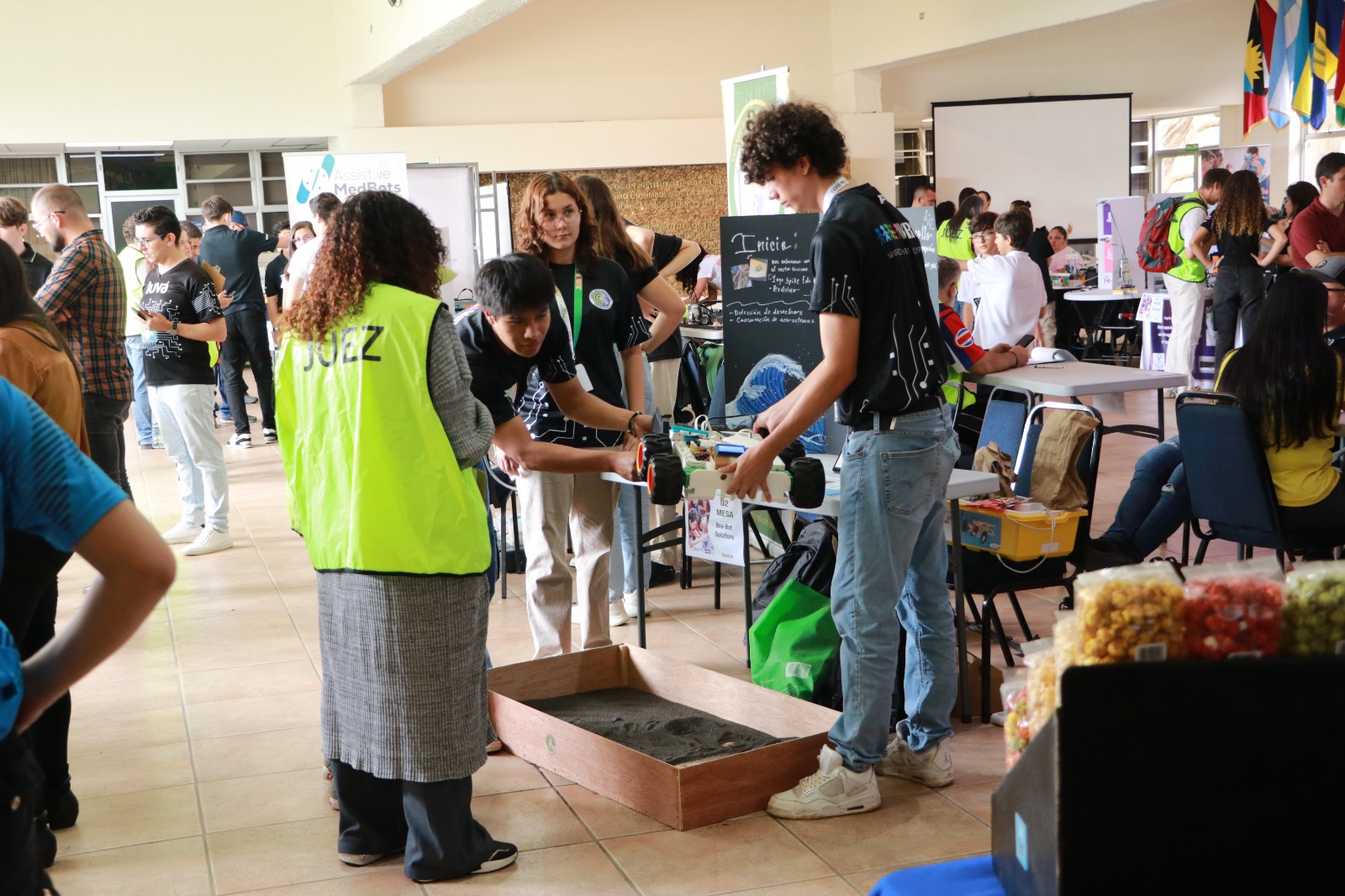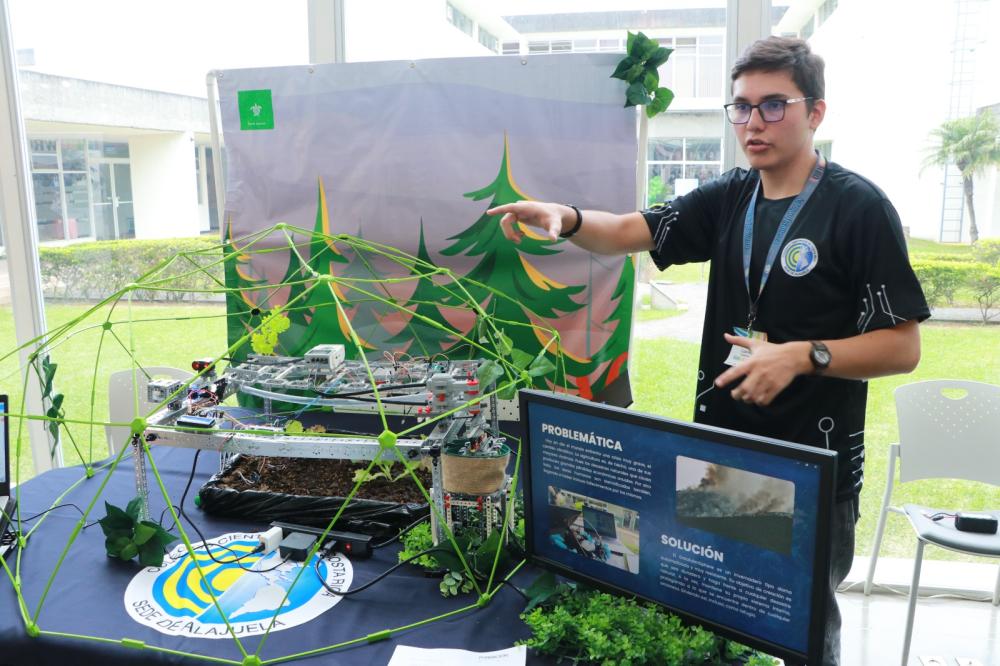Launched during Costa Rica’s 14th National Robotics Olympiad, the course aims to promote more sustainable practices, facilitate data-driven strategic decisions, and foster the adoption of technological innovations in agriculture across the region.

San José, 4 September 2024 (IICA). The Inter-American Institute for Cooperation on Agriculture (IICA) has launched AgriSTEAM, an online training program aimed at reducing the digital divide among young people in Latin America and the Caribbean, particularly those living in rural areas and those involved in the region’s agrifood sector.
This asynchronous, self-managed training program available on IICA’s virtual campus is designed to foster innovation and promote the adoption of digital technologies among young people. The study plan covers topics such as digital transformation in the agrifood sector, programming logic, sensorization, geoinformatics, and data analysis.
“AgriSTEAM equips young people involved in agriculture and other activities in rural areas with the core digital skills they need to tackle the challenges in the sector, foster innovation, and promote the adoption of new technologies that facilitate data-driven decision-making”, said Manuel Otero, Director General of IICA.
“We are focused on empowering young farmers, offering them support with technologies, data, and innovative initiatives. This training equips these individuals to spearhead the digital transformation of agriculture in the Americas”, he added.
Emmanuel Picado, Manager of Information and Communication Technologies and Digital Agriculture at IICA, explained that AgriSTEAM also fosters learning skills and innovation in young people, facilitating the adoption of new technologies in the agrifood sector.
“The program promotes the generation of data through the use of sensors and Internet of Things technologies, making it possible to capture accurate real-time information that is important in rural areas. It also includes the study of geoinformatics, which uses geospatial technology to map and analyze agricultural resources”, Picado said.
To participate in the program, just click on this link, register on IICA’s e-learning platform, and then sign up for the course.
2024 National Robotics Olympiad
The program was launched at the 2024 National Robotics Olympiad, targeted at young Costa Ricans and held at IICA’s Headquarters in San José.
The event brought together more than 1000 participants aged between 7 and 19 years old from public and private elementary schools and high schools from across the country. It was organized by IICA and the Steam Foundation of Costa Rica.
The winners in each category were:
- Elementary: The CaféTEC CR Project. Students from Saint Martin School, in San Marcos de Tarrazú, created a coffee tower for producing and harvesting coffee for drinking. The members of the group were Geiner Aran Cascante Mora, Lia Isabella Godínez Retana and Nayla Alana Sánchez Mora. They were trained by Daniela Pineda.
- Junior: The Innovabots Project. Students from Rosario de Naranjo Technical Professional School presented an atmospheric robot for automatic watering that can be used to irrigate plants in areas where there is a drought or little water available. Team members: Bianka Bolaños Sandoval, Mariam García Picado and Deylin Yariela Rojas Sandoval. They were trained by Johan Pineda.
- Senior: the winner was the Naranjo Technical Professional School, whose team developed an autonomous robot for pelleting and planting seeds, an agricultural technique that involves covering the seeds with organic materials that create favorable conditions for planting. The members of the group were Hilary Talia Molina Araya, Kristel Nicole Chaves Rodríguez and María Ángel Cruz Alfaro. They were trained by Rigoberto Román.

In another category, RoboMission, the teams worked with robots to solve challenges that simulate everyday situations in which the use of robots can help people. There were three winning teams: Discovery Muni from Cartago, made up of Sharon Brown, Matías Jiménez and Santiago Chacón, and trained by Andrés Carvajal; GearHeadsCR, comprised of Mathias Fernández and Daniel Acón, and trained by Jonathan Fernández; and INA-CENAT, composed of Jefferson Villalobos and Kendall Castro, and trained by Jeffry Ramírez.
Finally, in the RoboSports category, in which robots played tennis matches, the winners were the ARTEMIS team, made up of María Brenes, Sarah Barrantes and Victoria Mora, and trained by Maynor Rojas.
The 2024 National Robotics Olympiad was held as part of IICA’s Open Doors initiative, which seeks to foster technological innovation among young people and, at the same time, pave the way for a robotics championship focused on agriculture in 2025. This focus on integrating technology into agriculture reflects IICA’s commitment to supporting young people in the region and promoting the adoption of more sustainable agricultural practices.
More information:
Institutional Communication Division.
comunicacion.institucional@iica.int











